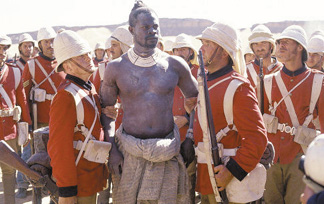The Four Feathers
Another long, dry war epic
By Rachel Deahl

“Fabulous kilt. Let me guess. Gaultier? Valentino?”
Although it's wrapped in the ilk of British history, Shekhar Kapur's paean to one of England's catastrophic campaigns in the Sudan during the late 1880s is plastered with the stuff of Yankee patriotism. Black Hawk Down by way of English imperialism, The Four Feathers delivers a compelling, if unsatisfactory, statement about the heroism of soldiering without condemning the diplomacy behind it.
Heath Ledger stars as Harry Faversham, the most admired and adored soldier in his regiment. The son of a renowned and decorated senior officer and the fiancé of the beautiful Ethne (Kate Hudson), Harry is primed to begin a charmed life. But when word comes down that his regiment is to be shipped off to North Africa to squelch a Sudanese revolt, the young soldier is overwhelmed with doubts and resigns his commission. In response to his withdrawal, Harry's friends (save his closest, played by Wes Bentley) and bride-to-be send him four white feathers as a symbol of cowardice.
Unable to overcome his shame, Harry cuts himself off from everyone and everything he knows. But when he learns of the high casualty rate the English battalions are suffering, he decides to go to Africa on his own, to save his friends. Once in the brutal deserts of the foreign land, Harry hides among the natives and sets out on a seemingly hopeless quest to fight his own battle.
Helmed effectively by Kapur (who was also behind the glitzy Elizabeth), this sweeping vision of the A.E.W. Mason novel slips back and forth between the endless sands of Africa and the colonial grandeur of the British Empire. But, aside from the watered down love triangle at its convoluted center, the real meat of The Four Feathers lies in Harry's confusing struggle abroad. Unable to pontificate why he didn't want to go to war in the first place (the root of it is neither fear nor political dissension according to him), Ledger's lost soul wanders through the desert as a displaced kind of mercenary waiting for his friends to fall into peril so he can save them. Luckily, Ledger has his own guardian angel in the form of an African drifter named Abou (Djimon Hounsou).
On the surface, The Four Feathers is an ode to the bonds of friendship, particularly those formed by young men on the front lines. And, like Black Hawk Down which managed to spin American soldiers as heroes in a story about a decidedly dark moment in U.S. military history, The Four Feathers celebrates the camaraderie of battle without appropriately condemning the machinations behind it. Like Ridley Scott's glossy war movie, The Four Feathers all but ignores the atrocities of English imperialism-most conveniently a colonized native (Abou) is the repeated savior of a colonizer (Harry). A personal film played out on an international stage, it's hard not to criticize The Four Feathers for, like its hero, being so blind to its historical surroundings.
But, with a surprisingly deft trio of lead performances from its young cast and some effectively harrowing combat scenes, The Four Feathers is not without its moments. The irony is that, while the battle scenes will transport some viewers back to the blood and gore of Braveheart, the pace and setting will remind others of The English Patient. The combination of styles and subplots leaves The Four Feathers in limbo somewhere between a love story, a war movie, and a tale of friendship. That the film belongs solely in none of these categories is its downfall- that it touches on all three is its greatest strength.
HOME | THIS ISSUE | ACE ARCHIVES